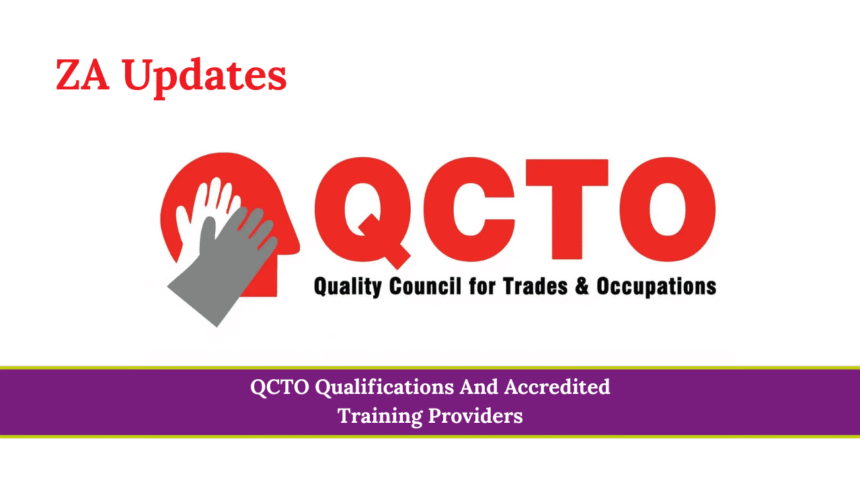QCTO Qualifications and Accredited Training Providers form a vital backbone of South Africa’s skills development landscape. As the country grapples with high unemployment and a persistent skills mismatch, the role of the Quality Council for Trades and Occupations (QCTO) has become more important than ever. Established under the Skills Development Act, the QCTO ensures that occupational training in South Africa remains relevant, quality assured, and aligned with industry needs.
What is the QCTO?
The Quality Council for Trades and Occupations (QCTO) is one of the three statutory quality councils responsible for education and training in South Africa, alongside Umalusi and the Council on Higher Education (CHE). Operating under the oversight of the Department of Higher Education and Training (DHET), the QCTO focuses specifically on occupational qualifications.
The QCTO was established to:
- Develop and maintain occupational qualifications under the Occupational Qualifications Sub-Framework (OQSF), which is part of the larger National Qualifications Framework (NQF).
- Oversee and accredit Skills Development Providers (SDPs) and assessment centres that deliver QCTO-approved training and assessments.
- Ensure the quality of learning programmes in trades and occupations.
- Certify learners who successfully complete these occupational qualifications.
Why are QCTO Qualifications Important?
In South Africa, there’s a strong push to close the gap between education and the real demands of the job market. QCTO qualifications are designed with this exact goal in mind. They are developed in close collaboration with industry stakeholders, including employers, SETAs (Sector Education and Training Authorities), and professional bodies. This ensures that learners acquire skills that are directly relevant to the workplace.
Moreover, because these qualifications are standardised and quality-assured across providers, employers trust that a QCTO certificate signifies a competent and job-ready graduate.
QCTO’s Core Responsibilities
1. Developing Occupational Qualifications
The QCTO leads the development of occupational qualifications that form part of the Occupational Qualifications Sub-Framework (OQSF). These qualifications range from artisan trades to advanced occupational certificates in fields like ICT, healthcare, and hospitality. For example, under the QCTO you’ll find qualifications such as:
- Electrician
- Chef
- Health Promotion Officer
- Software Developer
By working closely with industry experts and SETAs, the QCTO ensures that these qualifications stay up-to-date with technological changes and labour market demands.
2. Accrediting Training Providers
A key function of the QCTO is to accredit Skills Development Providers (SDPs). These are public TVET colleges, private training institutions, and employer-based training centres that have been evaluated and approved to deliver QCTO-registered programmes. Only accredited institutions can legally offer occupational qualifications leading to a QCTO certificate.
Similarly, the QCTO accredits assessment centres to conduct external summative assessments. This process maintains the credibility and standardisation of occupational assessments nationwide.
3. Quality Assurance and Certification
Quality assurance is at the heart of the QCTO’s work. The council monitors the delivery of training, ensures that assessment processes are fair and consistent, and audits the performance of accredited providers. Upon successful completion of a programme and external assessment, learners receive an official QCTO certificate, recognised across South Africa.
4. Trade Testing and Artisan Development
Through the management of Trade Test Regulations and Decentralised Trade Test Centres (DTTCs), the QCTO plays a pivotal role in certifying artisans. This is crucial for sectors like construction, manufacturing, and engineering where qualified artisans are in high demand.
How Does This Benefit Learners And Employers?
For learners, a QCTO qualification means:
- Gaining a nationally recognised certification that enhances employability.
- Receiving training that combines theoretical knowledge with practical workplace experience.
- Entering career pathways that are aligned with critical and scarce skills in the economy.
For employers, hiring someone with a QCTO-accredited qualification ensures that they’re getting an individual trained according to national occupational standards. This reduces on-the-job training costs and boosts productivity.
Occupational Qualifications Sub-Framework (OQSF)
The OQSF is the sub-framework of the NQF managed by the QCTO. It includes all occupational qualifications at NQF levels 1 to 8. These qualifications are typically structured to include:
- Knowledge modules: Covering the theory behind the occupation.
- Practical modules: Skills development in a simulated or training environment.
- Workplace modules: Application of skills and knowledge in a real-world setting.
This integrated approach ensures that graduates are not only knowledgeable but also job-ready.
How to Find Accredited Training Providers?
If you’re looking to study towards a QCTO qualification, it’s essential to enrol with a registered and accredited provider. The QCTO website (www.qcto.org.za) maintains an up-to-date list of accredited SDPs and assessment centres. This helps students avoid bogus colleges and ensures they receive a recognised qualification.
Supporting South Africa’s Economic Goals
The QCTO is more than just a regulatory body — it’s a crucial partner in South Africa’s efforts to tackle unemployment and build a globally competitive workforce. By focusing on occupational qualifications, the QCTO:
- Helps address skills shortages in key sectors.
- Contributes to the professionalisation of various trades and occupations.
- Ensures that South Africa’s workforce meets both local and international standards.
Useful Links for More Information
- QCTO official website: www.qcto.org.za
- Occupational Qualifications Sub-Framework (OQSF): Learn how qualifications are structured and managed.
Conclusion
The Quality Council for Trades and Occupations (QCTO) plays a vital role in shaping South Africa’s vocational training landscape. Through the development of QCTO qualifications, accreditation of Skills Development Providers, rigorous quality assurance processes, and the issuing of nationally recognised certificates, the QCTO ensures that occupational training remains credible, relevant, and impactful.










